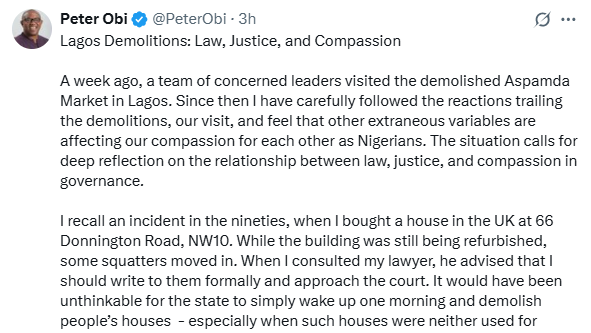Peter Obi, a former presidential contender, has urged the Lagos State administration to use leniency when enforcing the removal of buildings thought to have been constructed illegally around the state.
In response to the recent demolition of buildings at the ASPAMDA Market in the Trade Fair Complex, Obi made this statement on his X account this morning, October 7. He claimed that demolishing properties due to documentation errors—which he questions—is equivalent to giving a man who stole a bicycle the death penalty rather than a prison term. He questioned whether it was acceptable for the state government to destroy millions of dollars’ worth of investment just because it lacked the required paperwork.
His statement reads
‘’Lagos Demolitions: Law, Justice, and Compassion
A week ago, a team of concerned leaders visited the demolished Aspamda Market in Lagos. Since then I have carefully followed the reactions trailing the demolitions, our visit, and feel that other extraneous variables are affecting our compassion for each other as Nigerians. The situation calls for deep reflection on the relationship between law, justice, and compassion in governance.
I recall an incident in the nineties, when I bought a house in the UK at 66 Donnington Road, NW10. While the building was still being refurbished, some squatters moved in. When I consulted my lawyer, he advised that I should write to them formally and approach the court. It would have been unthinkable for the state to simply wake up one morning and demolish people’s houses – especially when such houses were neither used for crime nor taken for any overriding public purpose.
Those seeking to justify the current demolitions in Aspamda Market Lagos, and similar situations across Nigeria must be reminded that the law is not an end in itself; it is a means to ensure order, peace, and the protection of human dignity. When the law becomes an instrument to inflict undeserved pain – enforced without compassion or regard for human welfare – it ceases to serve justice.
Even if, for the sake of argument, some of the affected traders failed to obtain the proper approvals, which is unlikely, was demolition the only option? If opportunities for regularisation truly existed, as some have argued, why were they not pursued? Does it truly serve justice to destroy billions of naira worth of investments and livelihoods when less destructive remedies could have sufficed?
It is like punishing a man who stole a bicycle with death instead of imprisonment – a sentence grossly disproportionate to the offence. That is what these demolitions represent: a punishment that far outweighs any alleged infraction.
My appeal is simple: governance must always balance law with compassion. A government should not pride itself on being legally correct if, in the process, it becomes morally wrong. Justice, to be just, must be tempered with mercy.
These demolitions are a test of our collective humanity, justice, and compassion. Power must always be exercised with empathy – for it is in how we treat the vulnerable that the true character of leadership is revealed.
A new Nigeria is POssible.”


